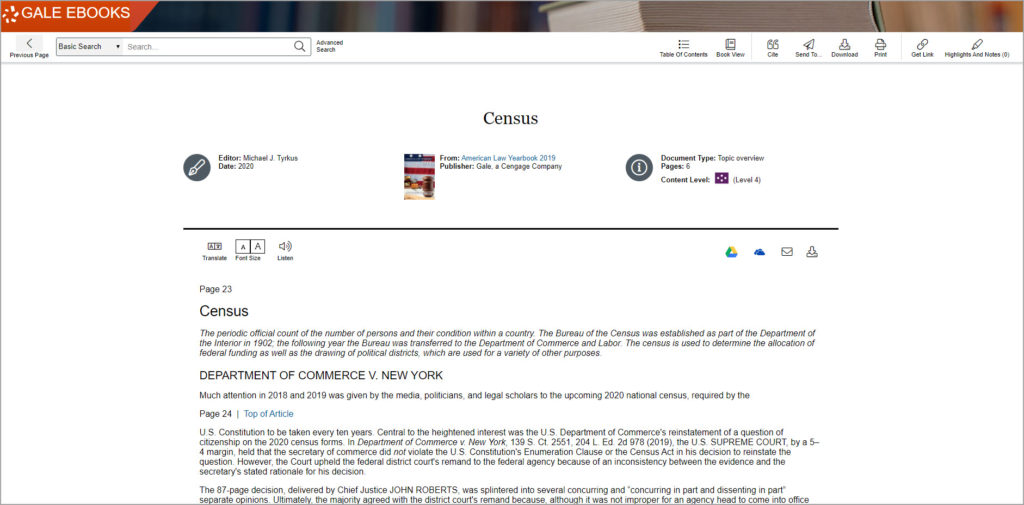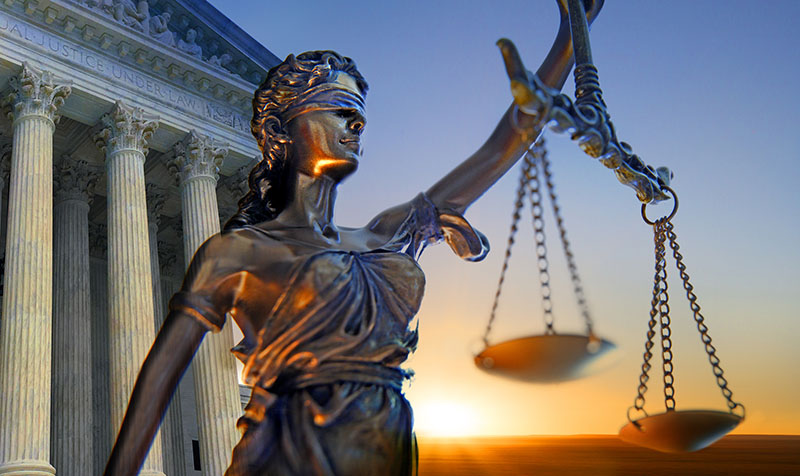| By Mike Tyrkus |
Since 1998, American Law Yearbook has served as a companion volume to extend the value of the Gale Encyclopedia of American Law by gathering the top legal stories from the previous year and then discussing them in concise, insightful entries written by legal experts. This year, the need for a layperson’s comprehensive and understandable guide to terms, concepts, and historical developments in American law is more critical than ever, and American Law Yearbook 2019 is more than up to the task of fulfilling such a role.
This past year, there were cases that called into question the validity of voting rights, the veracity of antitrust laws, the intention and purpose of certain aspects of the census, as well as the continued occurrence of double jeopardy, as these excerpts from American Law Yearbook 2019 illustrate:
- Rucho v. Common Cause
“The U.S. Supreme Court has struggled to define when voters and others may challenge voting maps that have resulted from partisan gerrymandering. In 2019 a closely divided Court ruled that this type of gerrymandering is beyond the reach of the federal courts . . . [a decision which] means that parties wishing to challenge the voting districts must do so at the state level” and that the Constitution does not necessarily bar instances of extreme gerrymandering.
- Apple Inc. v. Pepper
“In May 2019, the U.S. Supreme Court ruled that consumers suing iPhone creator Apple Inc. could go forward with their class-action claims against the electronics giant for alleged market monopolization.” When writing for the narrow majority of the decision, Justice Brett Kavanaugh concluded that “Apple exercises monopoly power in the retail market for the sale of apps and has unlawfully used its monopoly power to force iPhone owners to pay Apple higher-than-competitive prices for apps.”
- Department of Commerce v. New York
The U.S. Supreme Court “held that the secretary of commerce did not violate the U.S. Constitution’s Enumeration Clause or the Census Act in his decision to reinstate the [citizenship question on the 2020 census form]. However, the Court upheld the federal district court’s remand to the federal agency because of an inconsistency between the evidence and the secretary’s stated rationale for his decision.”

- Gamble v. United States
Terance Gamble “had already pleaded guilty to a charge of violating Alabama law regarding felons in possession of a firearm. But then prosecutors at the federal level indicted him not only for the same offense but also for the same incident/instance of possession. He pleaded guilty to the federal offense but appealed on grounds of double jeopardy. Both district court and the U.S. Court of Appeals for the Eleventh Circuit upheld his federal conviction, invoking the ‘dual sovereignty doctrine.’ Under this, two offenses are not the same offense ‘if prosecuted by different sovereigns.’” Later, “the Supreme Court agreed and affirmed.”
These cases, and many more, are discussed and analyzed within the pages of American Law Yearbook 2019, which is now available in print and eBook format on our platform, Gale eBooks.
Meet the Author
An award-winning independent filmmaker, co-writer and director of over a dozen short films, Mike Tyrkus has spent much of the last two decades as a writer and editor specializing in biographical and critical reference sources in literature and the cinema. He is a standing member of the Detroit Film Critics Society, as well as the group’s webmaster and current president. His contributions to the world of film criticism can be found in such places as the International Dictionary of Films and Filmmakers, Magill’s Cinema Annual, and the St. James Film Directors Encyclopedia (on which he collaborated with editor Andrew Sarris). Mike is also the editor of VideoHound’s Golden Movie Retriever. He currently lives in the Detroit area with his wife and their two dogs. You can find Mike on Twitter and Facebook, or at CinemaNerdz.com.

